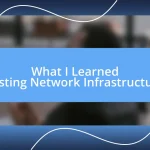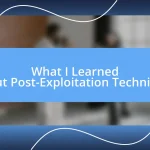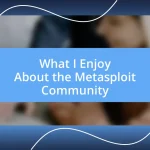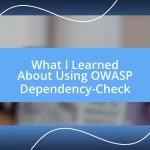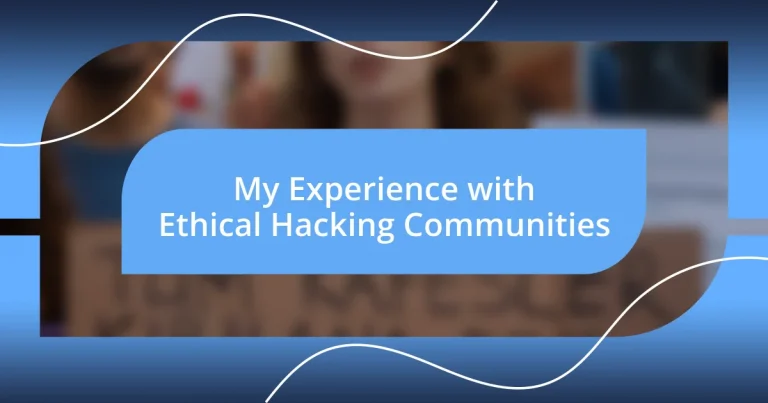Key takeaways:
- Joining ethical hacking communities fosters collaboration, innovation, and emphasizes responsible practices in cybersecurity.
- Networking and continuous learning opportunities within these communities can lead to career advancement and the development of essential skills.
- Participating in community projects and utilizing shared resources enhances individual growth, builds camaraderie, and provides practical insights into real-world challenges.
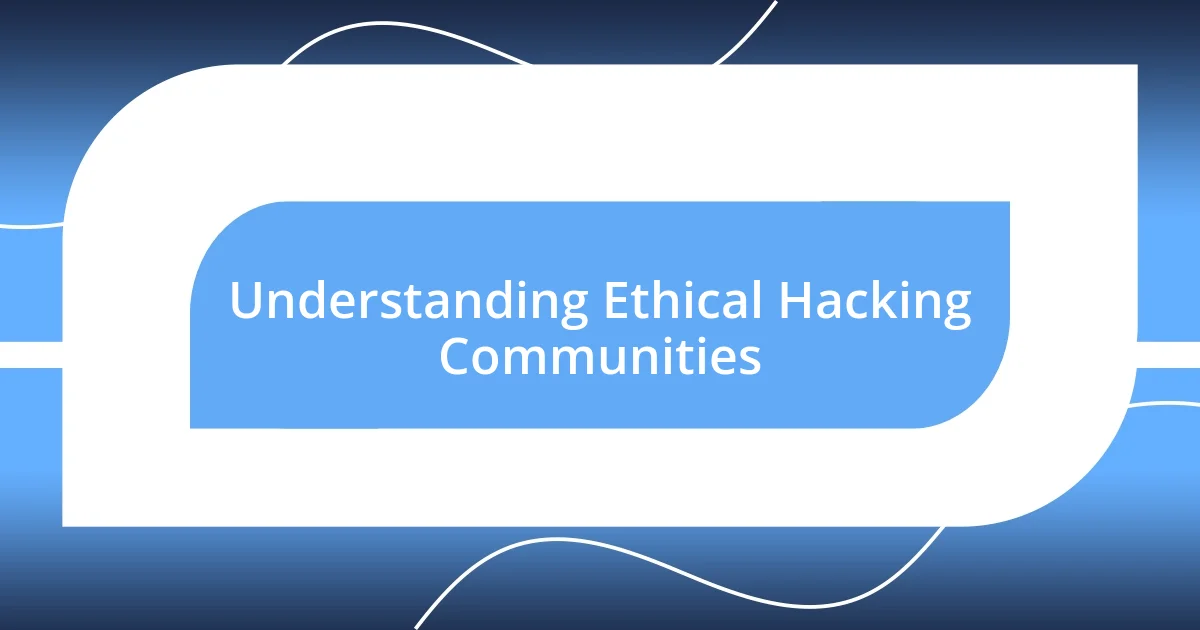
Understanding Ethical Hacking Communities
Ethical hacking communities are fascinating hubs for individuals passionate about cybersecurity. I remember my first experience joining one; it felt like stepping into a treasure trove of knowledge. The discussions were lively, and the willingness of members to share their insights struck me. Have you ever experienced that kind of camaraderie?
These communities often serve as a breeding ground for collaboration and innovation. I’ve seen countless projects born out of simple discussions or challenges posed in forums. It’s inspiring how a diverse group of people can come together to solve complex problems, each contributing their unique skills and perspectives. What if one idea shared by a member could lead to a groundbreaking solution?
Moreover, ethical hacking communities emphasize the importance of responsible practices. During one of my early encounters, a mentor emphasized the ethical considerations in cybersecurity. It hit me that with great power comes great responsibility. Are we doing enough to educate newcomers about this crucial aspect? Engaging in these discussions helps reinforce our commitment to ethical principles and the broader implications of our actions in technology.
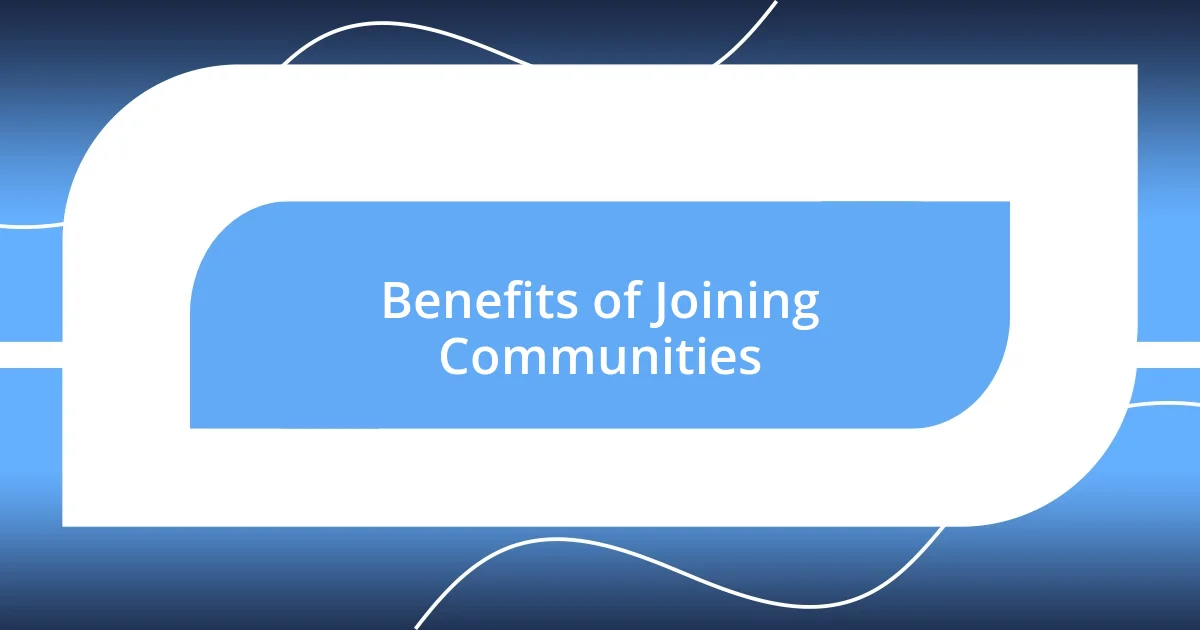
Benefits of Joining Communities
Joining ethical hacking communities can dramatically broaden your knowledge base. I recall attending my first online meet-up and being amazed by the wealth of information shared. A fellow member was gracious enough to walk us through a complex penetration testing case. It was an eye-opener to witness the collective expertise and how eager everyone was to help each other grow. Have you ever felt that rush of learning something new in the moment?
Networking opportunities in these communities are another significant benefit. I remember connecting with professionals who had landed jobs at leading tech firms, largely thanks to relationships built within the community. Sharing experiences and skills creates game-changing connections, often leading to collaboration on exciting projects. Isn’t it reassuring to know that you have support regardless of your career stage?
Lastly, the culture of continuous learning within these communities is invaluable. I’ve participated in various workshops that focused on the latest cybersecurity tools and techniques. Each session left me feeling energized and equipped with new skills to apply in real-world scenarios. It’s as if we are all co-pilots in this ever-evolving journey of technology together. Don’t you think that being part of such a vibrant learning environment can motivate us to push our boundaries further?
| Benefit | Description |
|---|---|
| Knowledge Sharing | Access to insights, tools, and case studies from experienced members. |
| Networking | Building professional relationships that can lead to job opportunities. |
| Continuous Learning | Engaging workshops and resources that keep you updated with the latest trends in ethical hacking. |
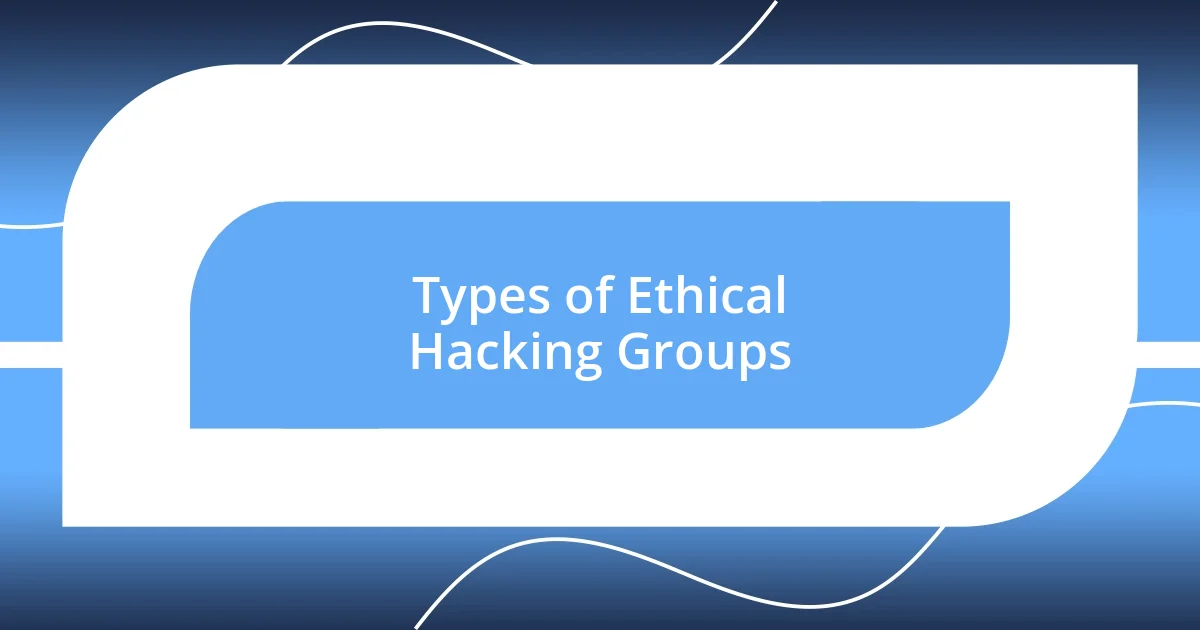
Types of Ethical Hacking Groups
When exploring ethical hacking groups, a few distinct categories stand out. I remember the excitement of first joining a local meet-up focused on penetration testing. It was thrilling to sit among experts and novices alike, sharing their knowledge in an environment where anyone could ask questions and learn. Different groups cater to varied interests, making it essential to find the right fit for your goals.
Here’s a look at some common types of ethical hacking groups:
- Local Meet-ups: Informal gatherings that foster learning and networking among members in a specific area.
- Online Forums: Virtual platforms where hackers from around the world share advice, tools, and experiences.
- Professional Organizations: Established groups that provide certifications, standards, and networking tailored to ethics in hacking.
- Workshops and Bootcamps: Intensive training sessions focused on particular skills or tools, often organized by members with specialized expertise.
- Hackathons: Competitive events where participants work in teams to solve challenges under time constraints, promoting teamwork and innovation.
When reflecting on these groups, I find that they can act like a safety net. One time, I attended an online workshop that turned out to be a game-changer for my skills. The instructor was incredibly personable, and I felt comfortable asking about some of my biggest hurdles. The support and encouragement I received were profound. It reaffirmed my belief that there’s power in community—an amplified learning experience, combined efforts, and a collective mission to improve cybersecurity practices.
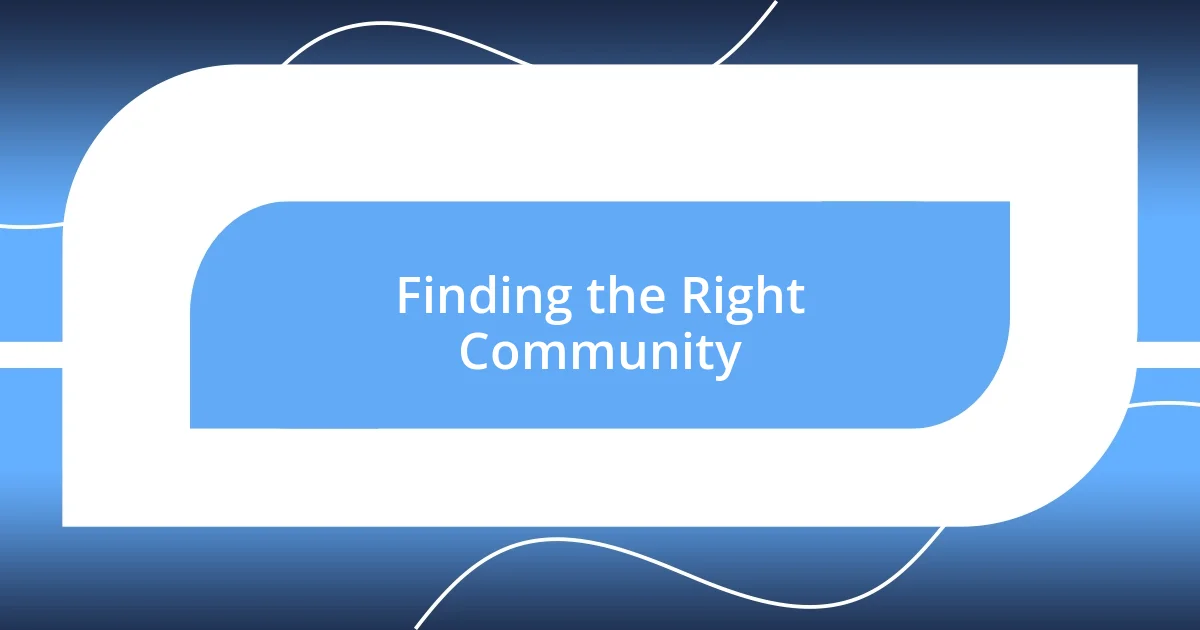
Finding the Right Community
Finding the right ethical hacking community can be pivotal for your personal and professional growth. I remember navigating various forums and meet-ups, feeling a mix of excitement and trepidation about where I would fit in. It hit me when I finally discovered a niche group that was passionately focused on vulnerability assessments; it was as if I found my tribe, a place where my curiosity and skills were welcomed.
It’s crucial to ask yourself what you want to gain from a community. Are you looking for mentorship, technical skills, or simply a space to share ideas? The first time I posed this question to myself, it opened my eyes to what truly mattered—for me, it was the chance to collaborate on hands-on projects with others who shared my enthusiasm. That’s when I became more intentional about joining groups that fit my aspirations, leading to transformative experiences that expanded my knowledge and network.
Moreover, don’t underestimate the value of community culture. I once joined a group that emphasized support and learning over competition, which was refreshing. The environment made it easy to engage, participate, and even fail without fear—allowing me to grow in ways I had never anticipated. Have you ever experienced that liberating feeling of being in a safe space where you could experiment and learn? It’s memories like these that remind me how essential it is to find a community that resonates with your personal values.
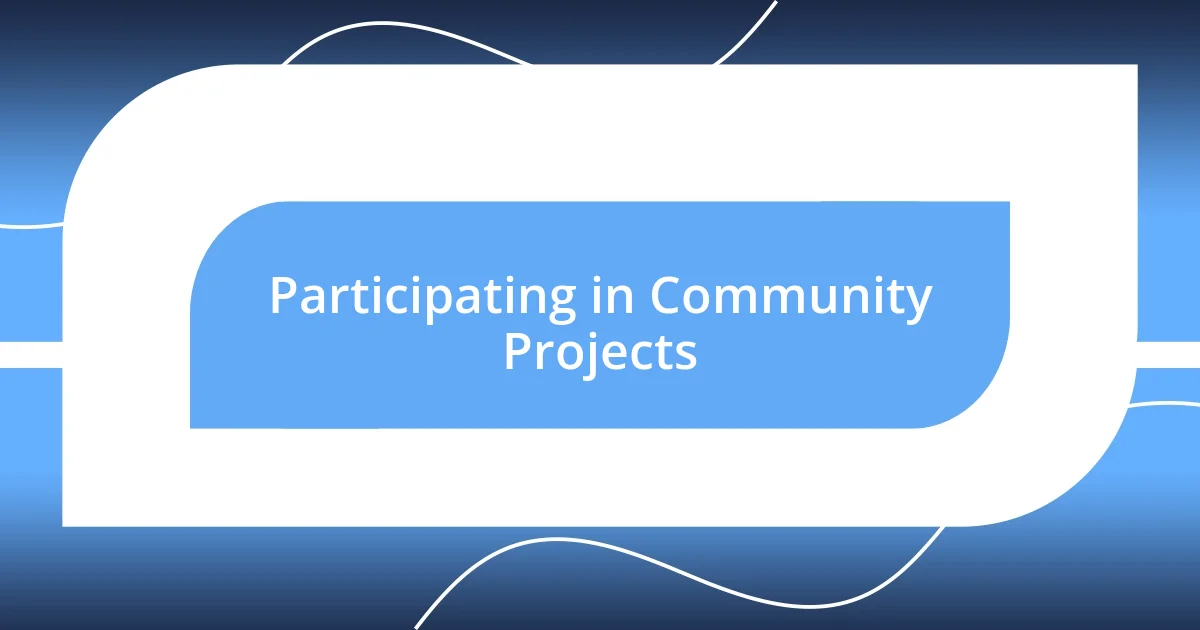
Participating in Community Projects
Participating in community projects offers an enriching experience that can significantly boost your skills and confidence. I once joined a collaborative vulnerability assessment project, where our varied skill sets came together. The synergy was palpable! It made me realize how diverse perspectives can bring new solutions to the table and enhance individual learning.
I’ve found that one of the most rewarding aspects of engaging in community projects is the camaraderie that develops. During a recent hackathon, I teamed up with individuals I had never met before, and it was incredible to see us transform from strangers into a cohesive unit in just a few hours. Have you ever felt that spark of creativity while working alongside others? That shared intensity created not only fantastic results but also lasting friendships.
Reflecting on these collaborative experiences, I can’t help but appreciate the value of collective challenges. When we tackled a particularly tough security issue as a group, I was amazed at how open everyone was to sharing their thought processes. It was a reminder that sometimes the best solutions come from open discussions and mutual support. Instead of feeling like a competition, it felt like we were all climbing the mountain together, and that’s a feeling I cherish.
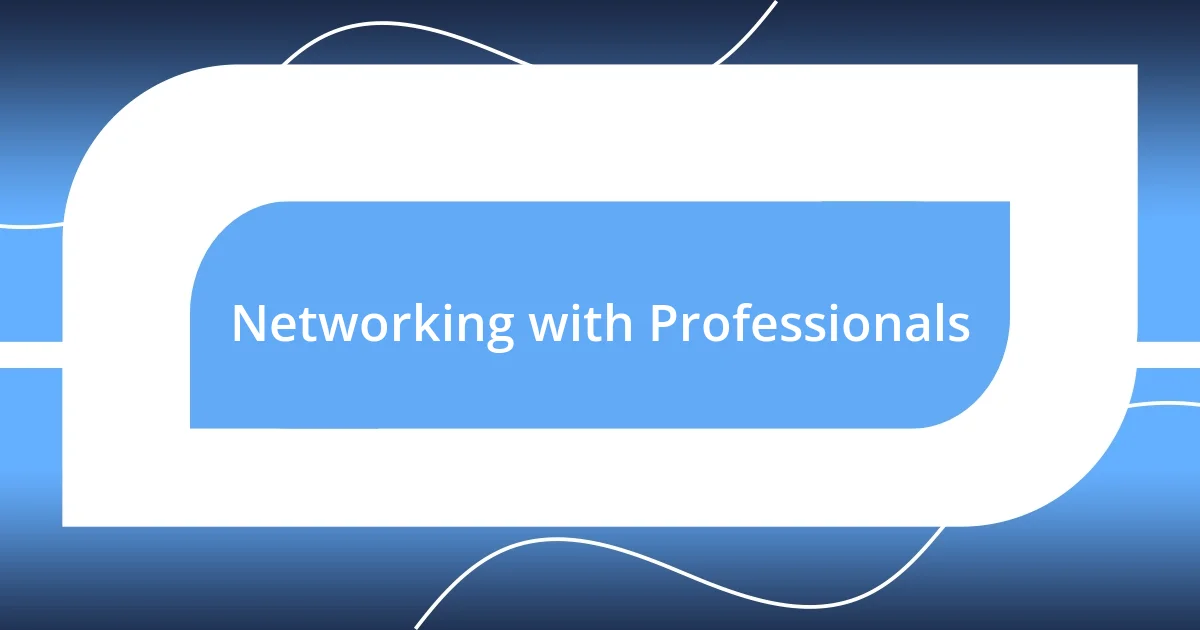
Networking with Professionals
Networking with professionals in the ethical hacking community can be a game changer for your career. I still remember my first industry conference; I approached a notable expert in the field with sweaty palms but came away with invaluable contacts and insights. It taught me that stepping out of my comfort zone could lead to opportunities I hadn’t even considered.
Chatting with seasoned professionals gave me an understanding that goes way beyond technical skills. During one gathering, a mentor shared stories about their career journey, filled with twists and turns that revealed the importance of adaptability and continuous learning. I couldn’t help but think, how many lessons are tucked away in those conversations? Those moments reinforced my belief that each professional encounter is a chance to absorb knowledge and inspire growth, making every networking opportunity worth it.
I’ve also found that following up with connections after events is crucial. I once reached out to a fellow attendee via LinkedIn, thanking them for a shared discussion on cybersecurity trends. The ensuing conversation not only led to potential collaborations but also expanded my perspective on emerging threats in our field. Have you ever realized that a simple message could unlock doors you didn’t even know existed? That’s where the power of networking truly shines, transforming fleeting interactions into meaningful relationships.
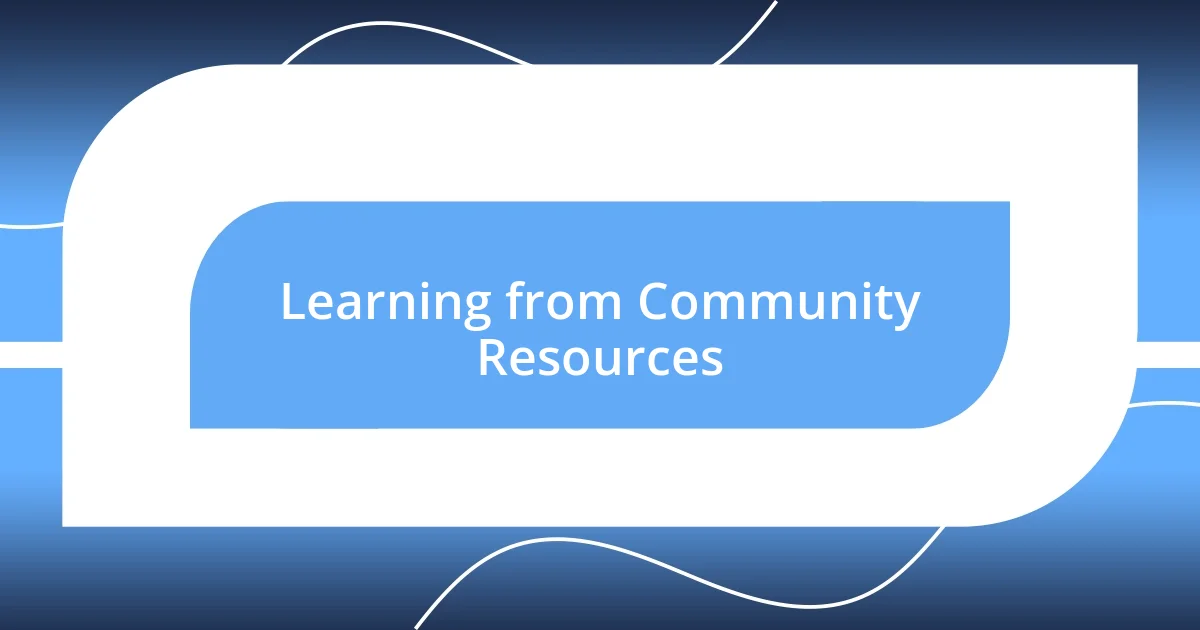
Learning from Community Resources
I’ve always found that diving into community resources can be a goldmine for learning in the ethical hacking space. For instance, I remember stumbling across an online forum dedicated to sharing scam-busting techniques. The collaborative troubleshooting discussions opened my eyes to methods I had never considered. Have you ever been surprised by what you can learn from others just by exchanging ideas? It felt like each post was a mini-lesson wrapped up in real-world scenarios.
One of my favorite resources has been free online courses offered by community members. I took a course on penetration testing that initially seemed overwhelming. But with the support of fellow learners who shared their struggles and triumphs, I felt increasingly confident in tackling complex concepts. I still recall a moment when a peer’s encouragement pushed me to solve a puzzle I had been stuck on for days. Isn’t it wonderful how learning alongside others fosters not just knowledge but also a shared sense of achievement?
Equally valuable are the live webinars hosted by community experts. During one session, an experienced hacker shared methodologies for conducting effective threat assessments. I remember taking notes furiously, feeling the excitement of gaining insider knowledge. It was this kind of direct interaction that made it feel like I was receiving a mentorship, even though we had never met. Have you experienced that thrill of learning directly from someone who’s been in the trenches? That kind of insight can truly elevate one’s skills and understanding far beyond textbooks.





